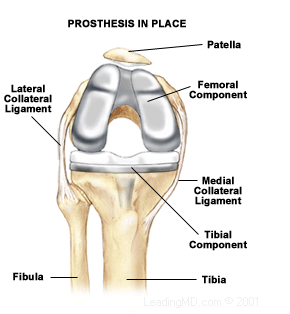
 Operative Recovery
Operative Recovery The incision must be kept clean and dry for the first two weeks after surgery to allow for healing. Two to three weeks after the operation, sutures or staples are removed during an office visit. During the recovery process, most patients use:
In some cases, the symptoms of knee
arthritis may disappear as early as two to three weeks after surgery,
but it may take up to six months to achieve full recovery. Usually
throughout this time pain steadily decreases.
The physician will check the patient's range of motion and functional
status six to eight weeks after surgery. The prosthesis should be
examined annually for loosening or wear.
Complications
Complications that follow knee replacement surgery are rare but can be severe. These include:
- infection of the joint, which usually requires additional surgery and treatment with antibiotics.
- If the wound doesn't heal properly, or the replacement components loosen, an additional surgery will be required.
- Medical complications such as deep venous thrombosis (blood clots) can occur.
- Existing heart, lung, and kidney problems can worsen.
- Fractures around the prosthesis may also require additional surgery.





